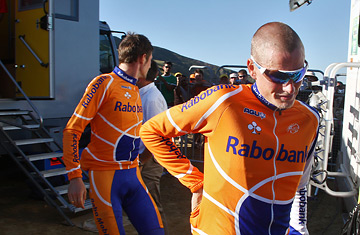
Denmark's Michael Rasmussen (R) leaves the anti-doping control car after the 16th stage of the Tour
Forget Barry Bonds and his controversy-dogged quest to set baseball's all-time home run record. For sports fans who thrill at accusations of doping by elite athletes and the scandals such suspicion provokes, there's only one place to be right now: the Tour de France.
Within the space of a few days, France's most prestigious annual sporting event has morphed into a tawdry drama. That happened when the cloud of suspicion about doping that generally hovers over cycling turned into a veritable thunderhead, and started raining allegations down upon some of the Tour's top riders. That deluge has now flushed some of the race's leading lights and teams right out of the competition.
The latest, ugliest spasm of scandal came Wednesday night, when Tour leader Michael Rasmussen was sent home by his Rabobank team after the Dane admitted having lied about his suspect pre-race training program. That logic was based on a move made a week before by Danish cycling authorities to kick Rasmussen off their national team headed for the 2008 Olympics. Danish officials say Rasmussen failed to provide required information as he trained for the current Tour — details on his whereabouts designed to allow anti-doping experts to perform surprise tests. Rasmussen's departure was greeted with relief by Tour directors, who fretted about how his probable overall victory would reflect on the scandal-rocked Tour's reputation. For much of the race, Rasmussen had been the target of surprisingly blunt accusations by fellow riders and the French media that the Dane's uncharacteristically mighty performances could be attributed to prohibited substances. As the rest of the Rabobank team prepared to continue on with the Tour, the French sports daily l'Equipe ran a full front-page photo of Rasmussen under the one-word headline "Banned."
Rasumussen was not alone in exiting the race Wednesday night, however: the entire Cofidis team pulled out after acknowledging one of its riders, Italian Cristian Moreni, had tested positive for testosterone.
Those dire developments were only the most recent wave of scandal dogging the Tour. Tuesday night, l'Equipe broke news that one of the race's top stars, Kazakh Alexandre Vinokourov, had tested positive for a prohibited blood transfusion after wowing fans with a resounding time-trial victory over the weekend. Although an appeal is possible and a backup analysis by the lab entrusted with testing is routine, Vinokourov promptly dropped out of the race and hustled home — a move replicated by his entire Astana team, at the request of Tour organizers seeking to protect the race's reputation. Though the 33-year-old Vinokourov and team managers deny any wrongdoing, French media reports say French police searches of Astana's hotel and garbage cans in the area had turned up unspecified "evidence" to support the allegations of performance-enhancement cheating. The shock of that news was so great that French and German riders staged a sit-in prior to the start of Wednesday's leg to protest the ill repute such purported practices have left both the sport and the Tour.
That move may be too little too late, given the residual impression left by previous allegations of doping. As speculation swirled around race leader Rasmussen, French gendarmes made unannounced inspections of their own on supply buses used by some participating teams — checks that generated more bad press for the Tour, although no banned substances were turned up in the raids. By now, however, the corrosive effects of suspicion had already begun to take their toll. After a German rider for the T-Mobile team tested positive for testosterone during the first week of the race, German TV channels ARD and ZDF announced they'd stop covering the Tour. By the time Vinokourov's ignoble exit, French newspaper Libération had decided to stop publishing daily Tour stage results, since the prevalence of doping undermined the reliability of such rankings. After Rasmussen was bounced out, daily paper France Soir ran a front-page obituary, lamenting the "death of the Tour de France on July 25, 2007, at the age of 104".
Why the dire reactions? Confirmation and eventual punishment of any doping infraction would require weeks of additional lab checks and probable appeals, after all. Meanwhile, allegations made thus far involve but a handful of the hundreds of riders in the current race. However, given the accuracy of l'Equipe's reporting of past Tour doping violations — and the strong record of the testing lab when past analyses have been challenged — all these elements have served to significantly stoke suspicions that have been accumulated and strengthened over successive Tours. Last year's winner, American Floyd Landis, was stripped of his title after failing a drug test after winning a spectacular mountain leg.
Such growing pessimism among cycling enthusiasts has organizers of the Tour and the sport's global body worried. And worried they should be. A recent poll in France's Journal du Dimanche showed that while 52% of respondents said they still loved France's marquee sporting event, 78% also said they always or often doubted the winners of the Tour and other cycling races did so without using performance-enhancing products. Of those, 80% thought the best way to battle doping in cycling was to ban offenders for life; 9% felt doping was now so integral to the sport that the only manner of saving it was to allow doping within controlled limits.
